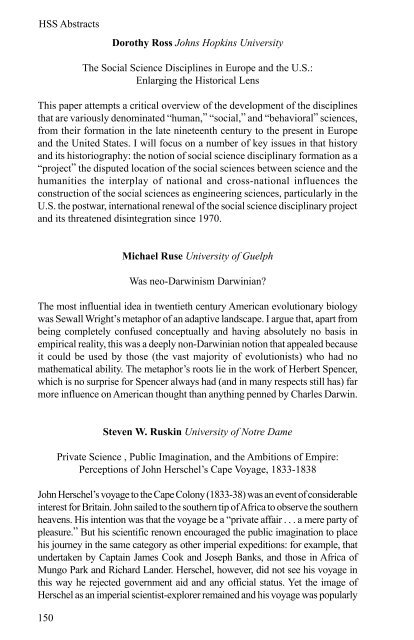2000 HSS/PSA Program 1 - History of Science Society
2000 HSS/PSA Program 1 - History of Science Society
2000 HSS/PSA Program 1 - History of Science Society
You also want an ePaper? Increase the reach of your titles
YUMPU automatically turns print PDFs into web optimized ePapers that Google loves.
<strong>HSS</strong> Abstracts<br />
Dorothy Ross Johns Hopkins University<br />
The Social <strong>Science</strong> Disciplines in Europe and the U.S.:<br />
Enlarging the Historical Lens<br />
This paper attempts a critical overview <strong>of</strong> the development <strong>of</strong> the disciplines<br />
that are variously denominated “human,” “social,” and “behavioral” sciences,<br />
from their formation in the late nineteenth century to the present in Europe<br />
and the United States. I will focus on a number <strong>of</strong> key issues in that history<br />
and its historiography: the notion <strong>of</strong> social science disciplinary formation as a<br />
“project” the disputed location <strong>of</strong> the social sciences between science and the<br />
humanities the interplay <strong>of</strong> national and cross-national influences the<br />
construction <strong>of</strong> the social sciences as engineering sciences, particularly in the<br />
U.S. the postwar, international renewal <strong>of</strong> the social science disciplinary project<br />
and its threatened disintegration since 1970.<br />
Michael Ruse University <strong>of</strong> Guelph<br />
Was neo-Darwinism Darwinian?<br />
The most influential idea in twentieth century American evolutionary biology<br />
was Sewall Wright’s metaphor <strong>of</strong> an adaptive landscape. I argue that, apart from<br />
being completely confused conceptually and having absolutely no basis in<br />
empirical reality, this was a deeply non-Darwinian notion that appealed because<br />
it could be used by those (the vast majority <strong>of</strong> evolutionists) who had no<br />
mathematical ability. The metaphor’s roots lie in the work <strong>of</strong> Herbert Spencer,<br />
which is no surprise for Spencer always had (and in many respects still has) far<br />
more influence on American thought than anything penned by Charles Darwin.<br />
150<br />
Steven␣ W. Ruskin University <strong>of</strong> Notre Dame<br />
Private <strong>Science</strong> , Public Imagination, and the Ambitions <strong>of</strong> Empire:<br />
Perceptions <strong>of</strong> John Herschel’s Cape Voyage, 1833-1838<br />
John Herschel’s voyage to the Cape Colony (1833-38) was an event <strong>of</strong> considerable<br />
interest for Britain. John sailed to the southern tip <strong>of</strong> Africa to observe the southern<br />
heavens. His intention was that the voyage be a “private affair . . . a mere party <strong>of</strong><br />
pleasure.” But his scientific renown encouraged the public imagination to place<br />
his journey in the same category as other imperial expeditions: for example, that<br />
undertaken by Captain James Cook and Joseph Banks, and those in Africa <strong>of</strong><br />
Mungo Park and Richard Lander. Herschel, however, did not see his voyage in<br />
this way he rejected government aid and any <strong>of</strong>ficial status. Yet the image <strong>of</strong><br />
Herschel as an imperial scientist-explorer remained and his voyage was popularly
















